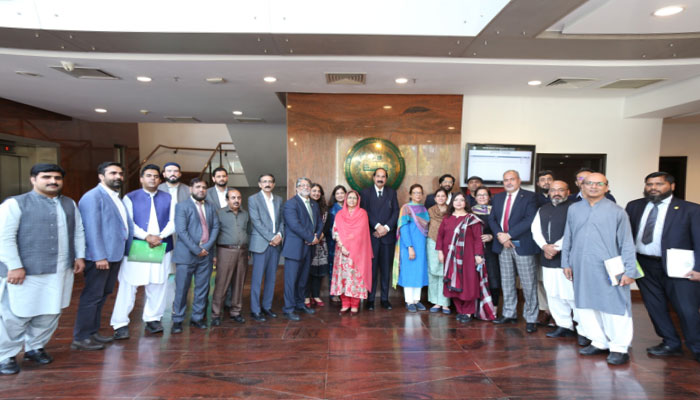Roundtable on public health held at PIPS
Islamabad : A high-level Parliamentary Roundtable on ‘Industrially Produced Trans-Fatty Acids (iTFAs), Partially Hydrogenated Oils (PHOs), and Human Health’ was held at the Pakistan Institute for Parliamentary Services (PIPS).
The event, organised collaboratively by Pakistan Youth Change Advocates (PYCA), Centre for Peace and Development Initiatives (CPDI), and PIPS under the Transform Pakistan campaign, brought together parliamentarians, health experts, civil society representatives, and regulatory authorities to discuss urgent measures for protecting public health through robust regulation of iTFAs and a legislative ban on the production and distribution of PHOs.
The session commenced with welcome remarks from Muhammad Rashid Mafzool Zaka, Executive Director of PIPS, who emphasised the institute's commitment to bridging civil society and parliamentarians for meaningful discourse. “PIPS is happy to facilitate this first important dialogue between legislators and public health experts on the eradication of industrial trans fats and PHOs from our dietary sources to ensure food safety across Pakistan,” he said.
In her opening remarks, PYCA’s Executive Director Areebah Shahid set the agenda, highlighting the alarming health risks associated with industrial trans fats and the critical need for regulatory and legislative action. “While PSQCA has made some progress in the past to regulate a few food categories, it is important to ensure that all foods are covered under a mandatory governmental iTFA regulation and legislators take the lead in banning the primary raw material for the production of iTFAs, i.e., PHOs. The latter is the main reason for initiating today's conversation,” she noted.
Dr. Tausif Janjua from the Ministry of National Health Services, Regulations, and Coordination (MNHSR&C) delivered the keynote address. “58% of all death in Pakistan annually are attributed to non-communicable diseases (NCDs) and iTFAs are a leading contributor to NCDs such as cardiovascular diseases, diabetes, stroke, Alzheimer’s, obesity and various cancers.” He underlined the pressing need for comprehensive regulatory measures to reduce the burden of NCDs caused by iTFAs.
Munawar Hussain, in-country coordinator for the Global Health Advocacy Incubator (GHAI), who presented international best practices.
At the end of the first session, Dr. Shazia Sobia Aslam Soomro, Member of the National Assembly, acknowledged the issue and pledged her support. “I wish this had been brought to my notice earlier. Nonetheless, now that it has, I will ensure that I play my role for food safety across Pakistan,” she said. Civil society leaders, including Mukhtar Ahmed, Executive Director of the Centre for Peace and Development Initiatives, highlighted the need for strategic partnerships.
-
 Garrett Morris Raves About His '2 Broke Girls' Co-star Jennifer Coolidge
Garrett Morris Raves About His '2 Broke Girls' Co-star Jennifer Coolidge -
 Winter Olympics 2026: When & Where To Watch The Iconic Ice Dance ?
Winter Olympics 2026: When & Where To Watch The Iconic Ice Dance ? -
 Melissa Joan Hart Reflects On Social Challenges As A Child Actor
Melissa Joan Hart Reflects On Social Challenges As A Child Actor -
 'Gossip Girl' Star Reveals Why She'll Never Return To Acting
'Gossip Girl' Star Reveals Why She'll Never Return To Acting -
 Chicago Child, 8, Dead After 'months Of Abuse, Starvation', Two Arrested
Chicago Child, 8, Dead After 'months Of Abuse, Starvation', Two Arrested -
 Travis Kelce's True Feelings About Taylor Swift's Pal Ryan Reynolds Revealed
Travis Kelce's True Feelings About Taylor Swift's Pal Ryan Reynolds Revealed -
 Michael Keaton Recalls Working With Catherine O'Hara In 'Beetlejuice'
Michael Keaton Recalls Working With Catherine O'Hara In 'Beetlejuice' -
 King Charles, Princess Anne, Prince Edward Still Shield Andrew From Police
King Charles, Princess Anne, Prince Edward Still Shield Andrew From Police -
 Anthropic Targets OpenAI Ads With New Claude Homepage Messaging
Anthropic Targets OpenAI Ads With New Claude Homepage Messaging -
 US Set To Block Chinese Software From Smart And Connected Cars
US Set To Block Chinese Software From Smart And Connected Cars -
 Carmen Electra Says THIS Taught Her Romance
Carmen Electra Says THIS Taught Her Romance -
 Leonardo DiCaprio's Co-star Reflects On His Viral Moment At Golden Globes
Leonardo DiCaprio's Co-star Reflects On His Viral Moment At Golden Globes -
 SpaceX Pivots From Mars Plans To Prioritize 2027 Moon Landing
SpaceX Pivots From Mars Plans To Prioritize 2027 Moon Landing -
 King Charles Still Cares About Meghan Markle
King Charles Still Cares About Meghan Markle -
 J. Cole Brings Back Old-school CD Sales For 'The Fall-Off' Release
J. Cole Brings Back Old-school CD Sales For 'The Fall-Off' Release -
 GTA 6 Built By Hand, Street By Street, Rockstar Confirms Ahead Of Launch
GTA 6 Built By Hand, Street By Street, Rockstar Confirms Ahead Of Launch




